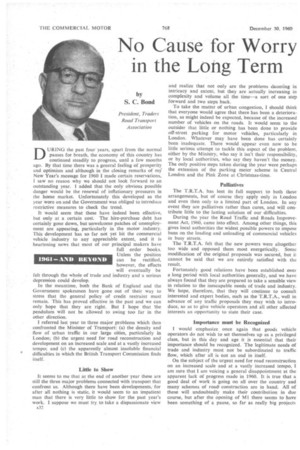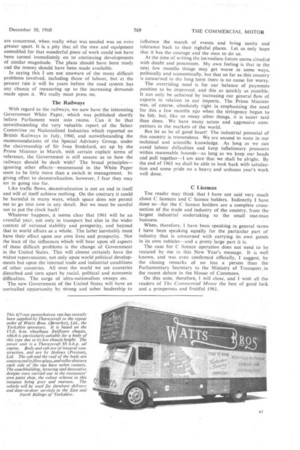No Cause for Worry in the Long Term
Page 34

Page 35

If you've noticed an error in this article please click here to report it so we can fix it.
by S. C. Bond
DURING the past four years, apart from the normal pauses for breath, the economy of this country has continued steadily to progress, until a few months ago. By that time there was a general feeling of prosperity and optimism and although in the closing remarks of m37 New Year's message for 1960 I made certain reservations, I saw no reason why we should not look forward to an outstanding year. I added that the only obvious possible danger would be the renewal of inflationary pressures in the home market. Unfortunately this developed as the year wore on and the Government was obliged to introduce restrictive measures to check the trend.
It would seem that these have indeed been effective, but only at a certain cost. The hire-purchase debt has certainly gone down, but unwelcome patches of unemployment are appearing, particularly in the motor industry. This development has so far not yet hit the commercial vehicle industry to any appreciable extent, and it is heartening news that most of our principal makers have full order books.
Unless the position can be rectified, however, the effects will eventually be felt through the whole of trade and industry and a serious depression could develop.
In the meantime, both the Bank of England and the Government spokesmen have gone out of their way to stress that the general policy of credit restraint must remain. This has proved effective in the past and we can only hope that they are right. But I hope that The pendulum will not be allowed to swing too far in the other direction.
I referred last year to three major problems which then confronted the Minister of Transport: (a) the density and flow of urban traffic in our large cities, particularly in London; (b) the urgent need for road reconstruction and development on an increased scale and at a vastly increased tempo; and (c) the apparently almost insoluble financial • difficulties in which the British Transport Commission finds itself.
Little to Show
It seems to me that at the end of another year these are still the three major problems connected with transport that confront us. Although there have been developments, for after all nothing is static, it would seem to an impatient man that there is very little to show for the past year's work. I suppose we must try to take a dispassionate view A32 and realize that not only are the problems daunting in intricacy and extent, but they are actually increasing in complexity and volume all the time—a sort of one step forward and two steps back.
To take the matter of urban congestion, I should think that everyone would agree that there has been a deterioration, as might indeed be expected, because of the increased number of vehicles on the roads. It would seem to the outsider that little or nothing has been done to provide off-street parking for motor vehicles, particularly in London. Whatever may have been done has certainly been inadequate. There would appear even now to be little serious attempt to tackle this aspect of the problem, either by the Ministry, who say it isn't their responsibility, or by local authorities, who say they haven't the money. The only positive steps taken during the year were perhaps the extension of the parking meter scheme in Central London and the Pink Zone at Christmas-time.
Palliatives
The T.R.T.A. has lent its full support to both these arrangements, but of course they apply only in London and even then only to a limited part of London. In any event they are palliatives rather than cures, and will contribute little to the lasting solution of our difficulties.
During the year the Road Traffic and Roads Improvement Act, 1960, came into effect. Among other things, this gives local authorities the widest possible powers to impose bans on the loading and unloading of commercial vehicles in busy streets.
The T.R.T.A. felt that the new powers were altogether too wide and opposed them most energetically. Some modification of the original proposals was secured, but it cannot be said that we are entirely satisfied with the result.
Fortunately good relations have been established over a long period with local authorities generally, and we have always found that they are prepared to take a sensible view in relation to the inescapable needs of trade and industry. We hope, therefore, that they will continue to consult interested and expert bodies, such as the T.R.T.A., well in advance of any traffic proposals they may wish to introduce, so as to give vehicle operators and all other affected interests an opportunity to state their case.
Importance must be Recognized
I would emphasize once again that goods vehicle operators do not wish to set themselves up as a privileged class, but in this day and age it is essential that their importance should be recognized. The legitimate needs of trade and industry must not be subordinated to traffic flow, which after all is not an end in itself.
On the subject of the urgent need for road reconstruction on an increased scale and at a vastly increased tempo, I am sure that I am voicing a general disappointment at the apparent lack of progress made in 1960. It is true that a good deal of work is going on all over the country and many schemes of road, construction are in hand. All of these will undoubtedly make their contribution in due course, but after the opening of MI there seems to have been something of a pause, so far as really big projects
are concerned, when really what was needed was an even greater spurt. It is a pity that all the men and equipment assembled for that wonderful piece of work could not have been turned immediately on. to continuing developments of similar magnitude. The plans should have been ready and the money should have been made available.
In saying this I am not unaware of the many difficult problems involved, including those of labour, but at the present rate it will be years before the road system has any chance of measuring up to the increasing demands made upon it. We really must press on.
The Railways
With regard to the railways, we now have the interesting Government White Paper, which was published shortly before Parliament went into recess. Can it be that notwithstanding the very valuable report of the Select Committee on Nationalized Industries which reported on British Railways in July, 1960, and notwithstanding the recommendations of the Special Advisory Group, under the chairmanship of Sir Ivan Stedeford, set up by the Prime Minister in March, with certain explicit terms of reference, the Government is still unsure as to how the railways should be dealt with? The broad principles— ignoring other effects—enumerated in the White Paper seem to be little more than a switch in management. In giving effect to decentralization, however, I fear they may err in going too far.
Like traffic flows, decentralization is not an end in itself and will of itself achieve nothing. On the contrary it could be harmful in many ways, which space does not permit me to go into now in any detail. But we must be careful not to put the clock back!
Whatever happens, it seems clear that 1961 will be an eventful year, not only in transport but also in the wider context of national stability and prosperity, and beyond that in world affairs as a whole. The latter inevitably must have their effect upon our own lives and prosperity. Not the least of the influences which will bear upon all aspects of these difficult problems is the change of Government in the United States. This will almost certainly have the widest repercussions, not only upon world political developments but upon the internal trade and industrial conditions of other countries. All over the world we see countries disturbed and torn apart by racial, political and economic difficulties. The surge of ultra-nationalism sweeps on.
The new Government of the United States will have an unrivalled opportunity by strong and sober leadership to influence the march of events and bring sanity and tolerance back to their 'rightful places. Let us only hope that it has the courage and themen to do so.
At the time of writing the immediate future seems clouded with doubt and "pessimism. My own feeling is that in the next few months things may get worse in some ways, politically and economically, but that so far as--this country is concerned in the long term there is no cause for worry.
The overriding need is for our balance of payments position to be improved, and this as quickly as possible. It can only be achieved by increasing our general flow of exports in relation to our imports. The Prime Minister was, of course, absolutely right in emphasizing the need for this a few months ago when the stringency began. to be felt, but, like so many other things, it is easier said than done. We have many astute and aggressive competitors in the markets of the world.
But let us be of good heart! The industrial potential of this country is tremendous. We are second to none in our technical and scientific knowledge. As long as we can avoid labour difficulties and keep inflationary pressures within reasonable bounds—as long as we keep our heads and pull together-1 am sure that we shall be alright. By the end of 1961 we shall be able to look back with satisfaction and some pride on a heavy and arduous year's work well done.
C Licences
Tne reader may think that I have not said very much about C licences and C licence. holders. Indirectly I have done so—for the C licence holders are a complete crosssection of the trade and industry of the country, from the largest industrial undertaking to the small one-man business.
When, therefore, I have been speaking in general terms I have been speaking equally for the particular part of industry that is concerned with carrying its own goods in its own vehicles—and a pretty large part it is.
The case for C licence operation does not need to be restated by me in this New Year's message. It is well known, and was even confirmed officially, I suggest, by the closing remarks of no less a person than the Parliamentary Secretary to the Ministry of_ Transport the recent debate in the House of Commons.
On this note, therefore, I will close, and I •wish all the readers of The Commercial Motor the best of good luck and a prosperous and fruitful 1961.




























































































